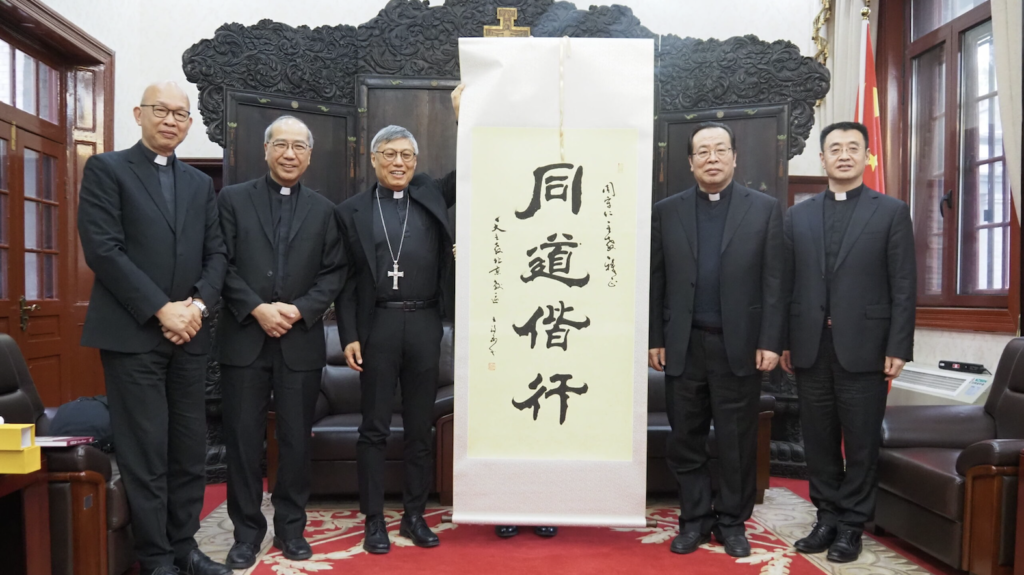Cardinal-designate Stephen Chow, who’s slated to get his red hat from Pope Francis in late September, has voiced confidence that the honor will aid in “building bridges” between the global Church and mainland China.
“The bridging role should be a significant contribution to the Church as a whole. I think the appointment as cardinal will strengthen the role of the Catholic Church in Hong Kong as a bridging church, to promote exchanges and interactions between mainland China and the universal Church,” Chow told Crux in a written interview from Hong Kong.
A Jesuit like Pope Francis, Chow was named bishop of Hong Kong in 2021 and was appointed a cardinal by the pope last month. He will get his red hat during a Sept. 30 consistory and will remain in Rome to participate in the Oct. 4-29 Synod of Bishops on Synodality.
His appointment comes at a time when the Vatican has stepped up its courtship of China, including a request from Vatican Secretary of State that an official liaison office be established in Beijing following the pope’s recent decision to formalize the unauthorized transfer of a Chinese bishop to the diocese of Shanghai.
The Vatican and Chinese authorities signed a controversial provisional agreement on the appointment of bishops in 2018 which has twice been renewed, but which has been repeatedly violated by Chinese authorities in recent months.
Chow himself this year made an April 17-21 visit to Beijing after receiving an invitation from Beijing Bishop Joseph Li Shan, marking the first time a Hong Kong bishop had traveled to Beijing since 1985, when Hong Kong was still a British colony.
In an interview with La Civilta Cattolica after his visit, Chow said he believed his visit to Beijing helped solidify relations between the Vatican and mainland China on a pastoral level, and he described his vision for the Church in Hong Kong’s role as a “bridge church,” aiding in dialogue between east and west.
Chow told Crux that he sees his appointment as a cardinal as “a positive sign that the Holy Father and the Holy See are close to the diocese and people of Hong Kong.”
“Our diocese will remain committed to our different pastoral works, and continue our local mission in education and social services to the different sectors of our social community,” he said.
Chow said he heard about his appointment on July 9 from a friend in Rome, after the pope had announced the consistory and his new cardinal-appointees.
“I was in disbelief at that moment and thought the message was missent. At the same time, I regard the appointment as a new mission from the pope, though I shall continue with my current mission as the bishop of Hong Kong,” he said.
Asked about Parolin’s proposal for a liaison office in Beijing and how he as a cardinal might support such an initiative, Chow said the office is “between the two governments,” and is thus not a pastoral concern for the Diocese of Hong Kong.
However, he reiterated his belief that his role as cardinal could also help strengthen Hong Kong’s role “as a bridging Church” in this sense, and that it could “promote exchanges and interactions between mainland China and the universal Church.”
Chow is a pontifical delegate to Pope Francis’s upcoming Synod of Bishops in October, which holds the theme, “For a Synodal Church: Communion, Participation, Mission,” and is focused on how to transform Church life and structures to make it a more welcoming place for all of its members.
When it comes to the application of the synod process in Hong Kong, Chow said the aim of the synod “is not to provide a temporary or one-time experience of synodality.”
Rather, he said, the aim is to “pray, listen, dialogue, discern and offer advice on making pastoral decisions in the long-term, which correspond as closely as possible to God’s will.”
“In this way, we continue to fulfill our mission to evangelize in the world. The same dynamics should apply to the church in Hong Kong,” he said.
When it comes to his own pastoral priorities, Chow said his main desire is to promote “the pastoral work of the local church, especially the formation for clergy, laity, and young people in particular, for a synodal and inclusive Church.”
“We will continue with our efforts to bring hope to our young people whose lives have been interrupted,” he said.
Chow said efforts toward reconciliation are also high on his list of priorities, saying he prays “that more hope will be nurtured for the young to create a better future with them.”

